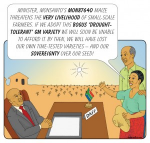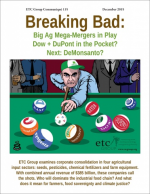GMO news related to the European Union
21.12.2015 | permalink
Yurok Tribe bans GMOs
YUROK COUNTRY – On December 10, 2015, after several months of committee drafting and opportunity for public comment, the Yurok Tribal Council unanimously voted to enact the Yurok Tribe Genetically Engineered Organism (“GEO”) Ordinance.
The Tribal GEO Ordinance prohibits the propagation, raising, growing, spawning, incubating, or releasing genetically engineered organisms (such as growing GMO crops or releasing genetically engineered salmon) within the Tribe’s territory and declares the Yurok Reservation to be a GMO-free zone. While other Tribes, such as the Dine’ (Navajo) Nation, have declared GMO-free zones by resolution, this ordinance appears to be the first of its kind in the nation.
19.12.2015 | permalink
WTO in Nairobi: Civil society expresses shock at draft agriculture text
Nairobi, 17 Dec (Ranja Sengupta) - Civil society representatives present at the WTO Ministerial Conference (MC10) have expressed deep shock and disappointment over a draft text on Agriculture released in the early hours of the morning here on the third day of the Conference.
The text was circulated by the Ministerial Facilitator on Agriculture (Lesotho) together with the Chair of the Committee on Agriculture in Special Session (Ambassador Vangelis Vitalis of New Zealand).
Civil society representatives, present at the Ministerial, expressed deep shock and disappointment over the text released today. The text has yielded nothing on the demands of developing countries, most civil society groups here felt.
Expressing deep disappointment over the text, Timothy Wise, Tufts University, USA, said, "The draft text on agriculture is a serious disappointment. It offers no progress on key deliverables demanded by developing countries - public stockholding and special safeguard for import surges - fails to even mention new disciplines on domestic subsidies, and in its one deliverable on export competition, the small progress on export subsidies is diluted by weak language on export credits and food aid, the two main instruments used by the US government to promote its exports. This text utterly fails to advance the development agenda."
18.12.2015 | permalink

Appeal against Monsanto´s controversial maize MON87460
South Africa is in the grip of the worst drought since 1992, with many parts of the country experiencing record temperatures and little to no rain. The maize and transport industries are currently planning for a worst-case scenario, where the continent’s largest maize producer – South Africa – may potentially need to import 4 million metric tons of maize due to the prolonged drought. It is against this backdrop that the South African government has granted approval to Monsanto for it to market its wholly inadequate and over-hyped ‘climate smart’ solution to drought– genetically modified (GM) drought tolerant maize, also known as ‘MON87460.’ The controversial maize was developed under the auspices of a Bill and Melinda Gates Foundation (BMGF) funded project called Water Efficient Maize for Africa (WEMA), currently operating in five African countries and aimed at ‘benefitting’ smallholder farmers.
The African Centre for Biodiversity (ACB) has consistently opposed MON87460 as unproven, unsafe and inappropriate for resource-poor smallholders. The organisation has formally appealed against its approval for commercial cultivation in South Africa. The Minister of Agriculture, Mr Senzeni Zokwana, has advised the ACB on the 15th December 2015 that he has established an Appeal Board to deal with this pivotal appeal next year.
- ACBio: APPEAL AGAINST MONSANTO’S BOGUS GM DROUGHT TOLERANT MAIZE HIGHLIGHTS NEED FOR URGENT AGRICULTURE TRANSITION
- Sabrina Nafisa, African Centre for Biodiversity: Profiting from the climate crisis, undermining resilience in Africa: Gates and Monsanto’s Water Efficient Maize
- Testbiotech comment on GM drought tolerant maize MON 87460
- Biosafety Scanner: Maize MON87460 GM EVENT AND DETECTION METHODS
17.12.2015 | permalink
Parliament rejects ‘unlawful’ proposal to import pesticide-resistant GM maize to the EU
Press release - December 16, 2015
Brussels - Today, the European Parliament dealt another blow to the Commission over GM crops, objecting to the import of Monsanto’s Roundup Ready™ Liberty Link™ GM maize into the EU. The Parliament said the decision to authorise the import of this GM crop was “not consistent with Union law” that aims at a high level of health and environmental protection.
The Commission authorised the GM maize earlier this month, without even waiting for the Parliament’s plenary to confirm its objection.
Greenpeace EU food policy director Franziska Achterberg said: “It is crucial that the Parliament challenges the Commission over its policy on genetically modified crops. Despite recurrent promises to change the rules and make the decision process for GM crops more democratic, the Commission has retained its disproportionate powers. It keeps using them extensively to push GM crops on the European market against widespread public opposition.”
- Greenpeace EU Unit: Parliament rejects ‘unlawful’ proposal to import pesticide-resistant GM maize to the EU
- The Greens | European Free Alliance: GMO authorisation: Scandalous authorisation of GM maize underlines need to overhaul EU approval procedure
- Motion for a resolution on Commission Implementing Decision (EU) 2015/2279 of 4 December 2015 authorising the placing on the market of products containing, consisting of, or produced from genetically modified maize NK603 × T25 (MON-ØØ6Ø3-6 × ACS-ZMØØ
- Slow Food Network: GM maize: Parliament and Commission debate
- Biosafety Scanner: Maize NK603 x T25 GM EVENT AND DETECTION METHODS
16.12.2015 | permalink

Breaking Bad: Big Ag Mega-Mergers in Play Dow + Dupont in the Pocket? Next: DeMonsanto?
December 2015. In this new report, ETC Group examines corporate consolidation in four agricultural input sectors: seeds, pesticides, chemical fertilizers and farm equipment. With combined annual revenue of $385 billion, these companies call the shots. Who will dominate the industrial food chain? And what does it mean for farmers, food sovereignty and climate justice?
Issue
The Big Six agrochemical corporations (BASF, Bayer, Dow, DuPont, Monsanto, Syngenta) that dominate commercial seed and pesticide markets worldwide now insist they must get bigger, faster if the world wants food security in the midst of climate chaos. According to agribusiness, the extreme pressures of population, demand for meat, and climate crisis require Big Science and Big Money – and that means extreme Mergers all along the industrial food chain.
- ETC Group: Breaking Bad: Big Ag Mega-Mergers in Play
- Capital Press: Dow-Dupont merger’s impact on competition may draw scrutiny
- Bloomberg Business: ChemChina Chairman Said to Meet With Syngenta in Bid Talks
- Reuters: Dow, DuPont set $130 billion megamerger, could spark more deals
- ETC Group: Global Agribusiness Mergers NOT a Done Deal
15.12.2015 | permalink
GM foods banned from school menus in Taiwan
TAIPEI, Taiwan--Schools nationwide are prohibited from providing genetically modified foods to students, according to the latest bill passed by the Legislature on Monday.
According to the Ministry of Education (MOE, 教育部), the new regulations would take effect next semester at the earliest, and students would likely be seeing a price hike of around NT$5 per meal.
The latest amendments to the School Health Act (學校衛生法) are aimed at all school meal providers, to ban genetically modified raw ingredients and any processed foods that contain genetically modified organisms (GMOs) from school menus.
The ban would affect the selection of ingredients often used in school lunches in the past, including soybeans, corn, salmon, tofu, and soymilk.
14.12.2015 | permalink
Azerbaijan strictly bans GMOs in the country
No GMO tobacco, wine and cotton products can be imported to Azerbaijan or produced in the country from now on.
While debates on the danger of the genetically modified organisms are continuing around the world, Azerbaijan strictly bans GMOs in the country.
Relevant amendments into the law ‘On Tobacco’, ‘On viticulture and winemaking’ and ‘On the cotton’ have already been drafted, the Parliament reported.
The changes to the law ‘On Tobacco’ ban the import of tobacco and tobacco products, which were produced using genetically modified plants or agricultural plants created with methods of biotechnology and genetic engineering.
11.12.2015 | permalink
Thailand: Government presses on with GMO bill
Hundreds gather in protest at Govt House
The government has insisted on pressing ahead with the enactment of a controversial bill regulating genetically modified organisms (GMOs) amid mounting opposition. However, it promised Wednesday to allow representatives of farmers and activists to air their opinions and share information with the National Legislative Assembly (NLA) during the bill's vetting.
10.12.2015 | permalink
Organics only bright spot for German farmers
Germany's farmers are having a tough time, with farm-gate prices for their produce in a radical slump. Organic produce and wine-growing are the only bright spots in an otherwise difficult agribusiness environment.
Over the past year, German farmers have experienced the dark side of global markets, as farm-gate prices for their products have crashed, with a global oversupply facing weakened demand.
One major factor was that Russia imposed an embargo on imports of European Union food products in August 2014. It was Moscow's tit-for-tat response to EU economic sanctions against Russia, imposed in connection with the geopolitical competition for influence over Ukraine.
Another factor was that the EU dropped its system of dairy quotas in April of this year - leaving European dairy farmers fully exposed to the vagaries of global supply and demand. It's a move they may have cause to regret.
09.12.2015 | permalink
Philippines' Supreme Court permanently stops field trials of Bt eggplant
MANILA - Field testing for genetically modified eggplant, also known as Bt (Bacillus thuringiensis) talong, has been permanently stopped by the Supreme Court (SC), while applications for the contained use, field testing, propagation, commercialization, and importation of genetically modified organisms (GMOs) have been temporarily halted.
On their last regular en banc session for the year on Tuesday, high court magistrates upheld the Court of Appeals (CA) in permanently stopping field trials for Bt talong.
The CA ruled that existing regulations by the Department of Agriculture (DA) and the Department of Science and Technology (DOST) are "insufficient to guarantee the safety of the environment and the health of the people."
